State Rep. Jack Williams denies wrongdoing amid federal bribery charges
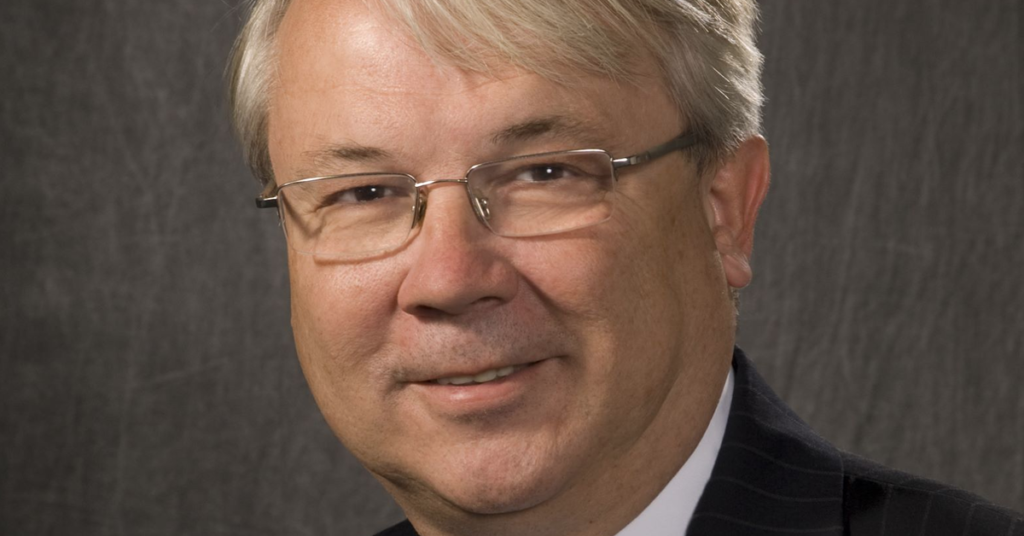
Longtime lawmaker, Vestavia Hills-Republican State Rep. Jack Williams, who was arrested Monday on federal bribery charges, released a statement Tuesday afternoon denying any wrongdoing and claiming his innocence. “I have done nothing wrong, and once the facts are presented, I expect to be found innocent by a jury of all the allegations outlined in Monday’s indictment,” Williams said in the statement. Williams was arrested Monday along with former Alabama Republican Party Chairman Martin “Marty” Connors, along with a California-based health care executive G. Ford Gilbert. If convicted, the men face up to 20 years in prison. Huntsville, Ala. attorney Jake Watson announced he is representing Williams in the trial. Watson also released a statement saying Williams will continue his campaign for the Jefferson County Commission, District 5, despite the charges against him. “Mr. Williams absolutely denies any wrong doing of any sort and has full faith in the judicial process and looks forward to presenting his side of the story in the courtroom, rather than the media,” Watson said. “The courtroom is the proper place to present evidence and testimony supporting his innocence.” Read Williams’ full statement below: I have done nothing wrong, and once the facts are presented, I expect to be found innocent by a jury of all the allegations outlined in Monday’s indictment. I trust our judicial system and our electoral system; they have both protected individual rights for hundreds of years. I have served honorably in the legislature for over a decade and will continue to do so until my term expires. I also will push forth with my campaign for Jefferson County Commission. This statement is all I will say about the topic until I have my constitutionally-guaranteed day in court. Read William’s attorney’s statement in full: I am representing Jack D. Williams against allegations made in the federal indictment from the Middle District of Alabama. Mr. Williams absolutely denies any wrong doing of any sort and has full faith in the judicial process and looks forward to presenting his side of the story in the court, rather than the media. The courtroom is the proper place to present evidence and testimony supporting his evidence. Mr. Williams will continue to represent his district in the State House and will continue to campaign for Jefferson County Commission, District 5.
State School Board outlines plans for selection of new State Superintendent

The state school board on Tuesday outlined plans for the selection of the new State Superintendent of Education culminating with the final selection taking place on April 20. The following dateline describes the process by which the new State Superintendent of Education will be selected: Thursday, April 12, 10 a.m.: Executive Leadership Search Firm, Ray and Associates, will meet with the State Board during the work session to explain the process. They will also answer board members’ questions after the presentation. They are currently checking resumes, contacting references, and processing background checks. Please do not contact the search firm. They will provide a complete report to the entire state board at the work session. Friday, April 13, 9 a.m.: Ray and Associates will meet with the state board to recommend a list of semifinalists based on board criteria and the firm’s research. Board members will select finalists for interviews. Friday, April 20, 10 a.m.: Finalists will be interviewed and the board will vote to select the next Alabama State Superintendent of Education. Ray and Associates will guide the interview process which will be explained in more detail at the work session on April 12. School board members are endeavoring to find a replacement for former Superintendent Michael Sentence, who resigned in September 2017. Sentance had been named to the position August 2016. With less than a full year under his belt as the State Superintendent, he found himself on the firing line in July 2017 as the Alabama Board of Education began to question his performance. Sentance, who oversaw nearly 900 employees at the Alabama State Department of Education (ALSDE), was given a performance review by the state Board of Education in July, where in received low marks. In the months that followed, Sentance has found himself at the center of a debate as to whether or not he should be removed from his position. Many expected his firing to be eminent, but he resigned before it could happen. Ed Richardson — who previously served as the Alabama State Superintendent of Education from October 1995 to January 2004, and then as President of Auburn University from 2004-2007 — is currently serving interim state education superintendent until the position is filled.
Woman of Influence: Birmingham City Councilor Lashunda Scales
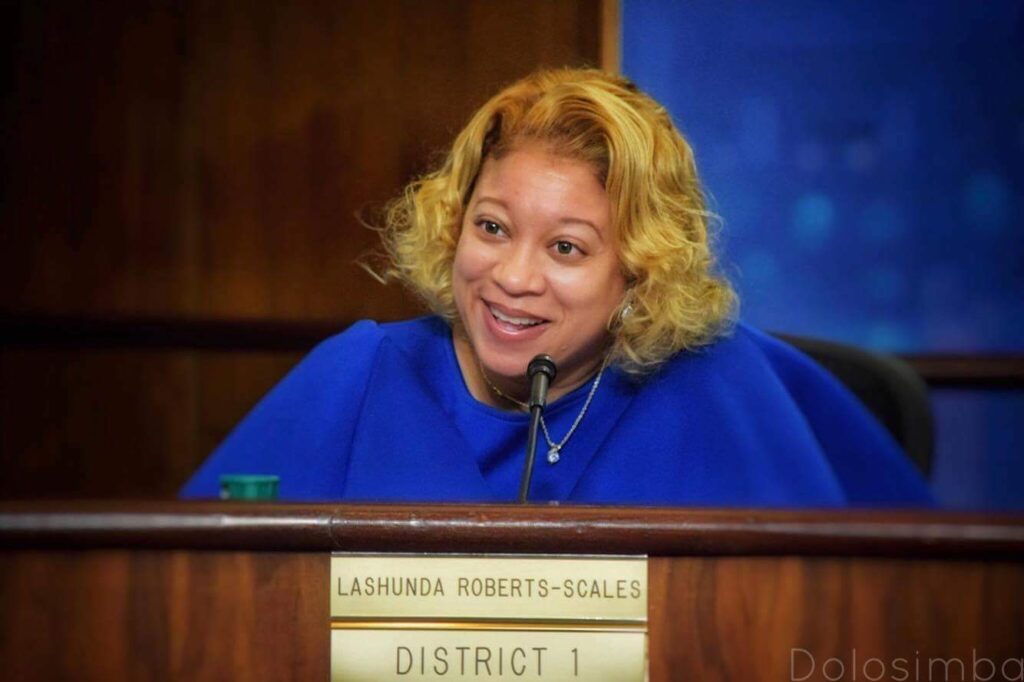
“Above all, you must remain humble; know when you’ve been blessed to have an opportunity and always share your gift.” Lashunda Scales has been serving her community in Birmingham for over 20 years. An entrepreneur, Birmingham City Councilor, Chair of the Governmental Affairs/Public Information Committee and a member of the Economic Development and Transportation Committees, it’s safe to say Scales is a very influential woman. She was born and raised in Birmingham, Ala. where graduated from the Birmingham City School System. She went on to attend Stillman College in Tuscaloosa, Ala. and married her husband Michael in 1991, at 20 years old. Scales took a bit of an “untraditional” path, never graduating from Stillman College; but becoming a homemaker, holding several jobs for family members until 2000 when she started her own Public Relations firm. “My PR skills are completely self taught,” said Scales. “I had no formal education in it. One day while working for my fathers national promoting business I called news stations and newspapers to get the word out about a new promotion and realized I really enjoyed what I was doing. I had found my niche.” Scales has spent the past 18 years building her business while serving her community. In 2003 she returned to college, and graduated from Jefferson State Community College in 2005. She was first elected to the Birmingham City Council, District 1 seat in 2009, a position that she has held since then. As a city councilor she coordinated the Birmingham City Council’s 50th Anniversary Swearing-In Ceremony and Music Festival, the Council’s Neighborhood Small Business Economic Development Summit, and host’s regular informative town hall meetings. Scales completed Harvard’s Leading Economic Growth program from the Harvard University Kennedy School in 2015, and completed the 21st Century Leadership program through the same school in 2016. She also graduated from Leadership Birmingham’s program in 2016. She and her husband Michael live in Birmingham, and have two adult children. Scales is an ambitious woman with a story that many young women can relate to and was kind enough to answer some of Alabama Today’s questions about her life, work and influences: How have other women influenced your success? There are three women who have influenced my personal life – my mother, who was a single parented and worked very hard as a nurse to raise four children on her own; my grandmother (my mother’s mother) who was an advid homemaker; and my father’s mother, who was a highly recognized entrepreneur until her death in 2012. Politically, Shirley Chisholm, Elizabeth Warren and First Lady Michelle Obama. Chisholm for her courageous stance against powerful political machines and special interest groups seeking to overpower the will of the people’ through the use of their influence. Senator Warren for her strong stance on issues affecting ‘blue collar’ workers and our country’s most vulnerable citizens. Obama for her ability to assume the role of first lady while savvy enough to use this role to impact the lives of citizens who are often overlooked and underserved. I am inspired by these women because they used their political positions to effectively change the lives of others. What shaped your desire to serve Birmingham through the city council? For me, it was divine inspiration. 14 years ago, I partnered with 10 Birmingham City Schools on Birmingham’s east side with the intent to make a transformative difference in the community where I live. I believe students, if given proper exposure and opportunities can change the world. To to help senior citizens by providing a better quality of life is very rewarding. That is by using my position to change laws, policies and by being apart of the legislative process that directly impacts citizens lifestyle is what brought me to public service. What has been your favorite area of service, and what is your favorite thing about that position? I’ve always enjoyed working with youth and senior citizens. I love being able to impart the life lessons and education that I have received, to students so they can not only achieve great things, but be better than myself at a much younger age. I also enjoy working with senior citizens, because I cherish the mutual trust that we have in one another. My constituents trust me to make decisions on their behalf and being a voice for the underserved, or a voice for the voiceless; is what I enjoy the most. How has being a small-business owner impacted your view of community service? Being a business owner has helped me to take the personalities out of politics. We are called to serve, yes, but as a business owner I look at budgets and public infrastructure from a business perspective. I look at it from the lens of ‘how would I spend money as a business owner to best meet the needs of citizens.’ Needs always come first and ‘wants’ come at a later time. It’s important to understand that in order to make a successful city, you must first make the people, and the neighborhoods they live in successful. What advice would you give to young women who want to start their own business or politicians? If you want to start your own business, you have to be able to count the cost of your endeavor. There has to be a need for your product or service and you have to have realistic goals both short term and long term to be successful. Even in business you should think of how you’re providing a service that no one else has. You have to be committed to your craft and understand that you will have ups and downs, but commitment equals success. You have to commit not only the initial product, but to reinventing that product to guarantee your long-term success. My company is ever evolving, because I stay on The cutting edge of my company’s presentation to potential clients and by creating innovative ways to keep my company relevant. If you want to serve in a public office, again count the cost of your endeavor. Your public
Apple CEO Tim Cook to receive human rights award in Birmingham

The Birmingham Metro Southern Christian Leadership Conference (SCLC) is honoring Apple CEO and Mobile, Ala. native Tim Cook with a civil rights award. According to the AP, Cook will receive the 2018 Human Rights Award for his advocacy for equality and safety in the workplace. Annually, the Human Rights Award recognizes those individuals who have continued the legacy of the SCLC’s founding president, Dr. Martin Luther King, Jr., who worked tirelessly to advance human and civil rights. Cook will receive the award on the 50th anniversary of Dr. Martin Luther King, Jr.‘s assassination at their annual Keeper of the Dream Awards Banquet on April 4
Business Council of Alabama endorses Steve Marshall for Attorney General
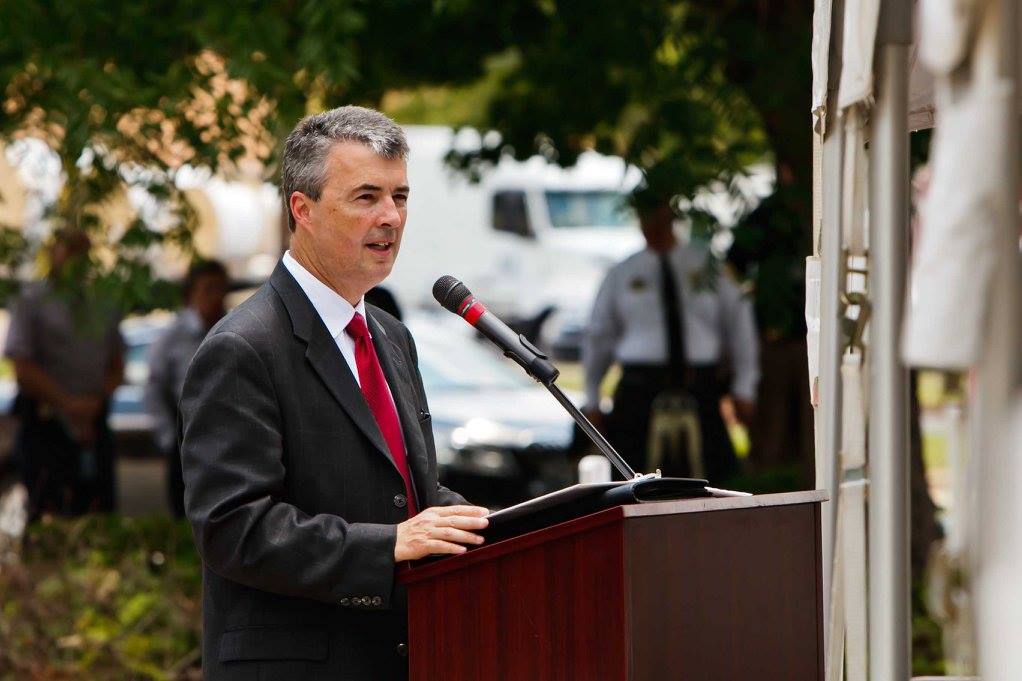
ProgressPAC — the political action committee of the Business Council of Alabama — on Monday announced the endorsement of incumbent Attorney General Steve Marshall in the Republican primary. “Attorney General Steve Marshall’s commitment to the rule of law, putting violent criminals in jail and working to put an end to the opioid crisis made our endorsement an easy decision. His willingness to fight federal overreach makes him a tremendous asset to Alabama’s vibrant business community,” said ProgressPAC Chairman Mike Kemp. ProgressPAC’s board of directors said they voted to endorse Marshall because of his character and his support of issues that are important to Alabama’s business community. “For these reasons and others, ProgressPAC is proud to endorse Steve Marshall in the June 5 primary,” explained Kemp. Marshall said he is honored to receive the endorsement. “ProgressPAC understands the importance of fostering a pro-business environment in Alabama and I’m honored to receive their endorsement,” said Marshall. “This support from the business community will give us great momentum heading into the June primary.” Marshall served as district attorney in Marshall County Ala. for 16 years. He built a reputation of fighting crime and was instrumental in the passage of state legislation to track the sale of ingredients used to produce crystal meth. Marshall also took a lead role supporting the passage of the Brody Act which has made it possible to prosecute criminals for two crimes if they kill or injure an unborn baby during an attack on the mother. Marshall also serves as co-chair of Governor Kay Ivey’s Opioid Overdose and Addiction Council. Steve and his wife, Bridgette, have a daughter named Faith and currently reside in Albertville, Ala. Marshall faces Alice Martin, Chess Bedsole, and Troy King in the June 5 Republican primary.
Kay Ivey won’t commit to gubernatorial debates
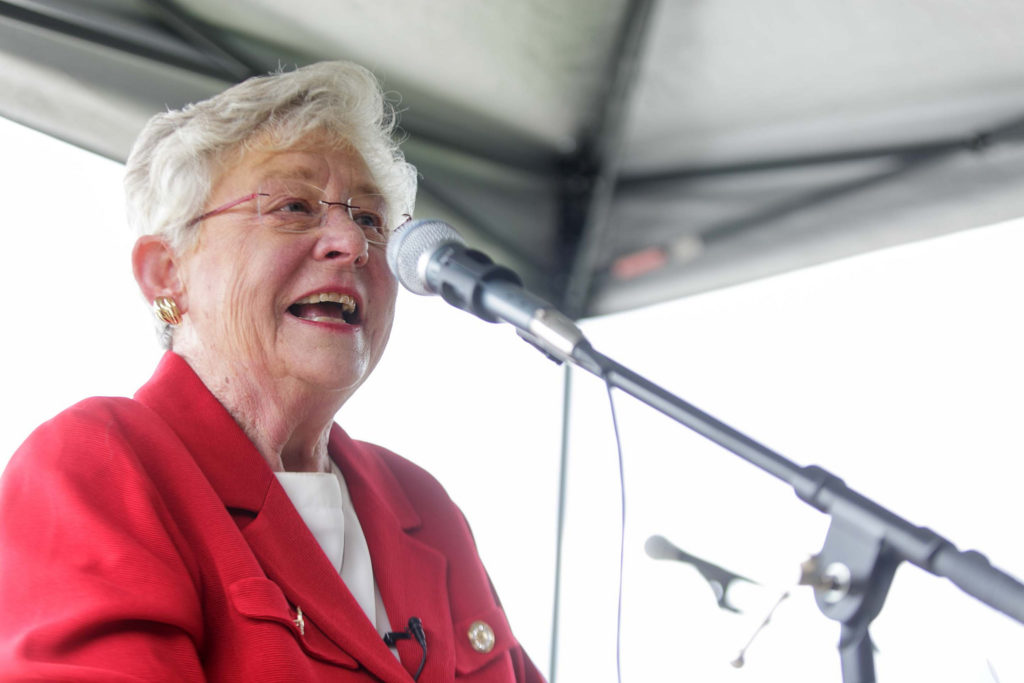
Alabama Governor Kay Ivey has been called upon by several gubernatorial candidates to join them in debates across the state; but she just can’t seem to commit. In an interview with WHNT News 19 on Monday, Ivey was asked about her plans for debating the other candidates. “I am focused on letting people know my record, I go wherever I can schedule going, but I’ve got to govern first and sometimes there are conflicts on when they want to debate, but my job first is to govern, and be responsive to the people,” she explained. In March, Huntsville Mayor and Republican gubernatorial candidate Tommy Battle extended an invitation to Ivey to appear with him at several political events, candidate forums, and debates across the state. Other candidates joined Battle’s call on Ivey, “I’m ready to debate anytime, anywhere,” Mobile-Republican State Sen. Bill Hightower told AL.com. “I’ve got some great ideas I want to tell Alabama about. So everybody’s talking about it but I’m ready to do it… I will do it on my own if nobody else does it. I think I’ve got the best ideas.” “Everyone says they want a debate,” evangelist Scott Dawson said in the same report. “So if you say you’re going to debate, then the next step is actually debating.” “I’ve extended an invitation to her to join us in sharing our vision with the people of the state of Alabama. I’ve always believed people make time for things that are important to them. The people of Alabama are important to me and sharing my plan for this state with them is important to me,” said Battle in a release on Tuesday. WHNT asked Ivey if she would be attending the April 18 debate hosted by AL.com. She responded by saying that she is currently committed to working with the Restore Council and the NRDA Council in Mobile, Ala. that day and will not be attending. Dawson, Battle, and Hightower have already committed to attend the debate. Ivey faces Battle, Hightower, Dawson and Michael McAllister in the June 5 Republican primary.
Walt Maddox announces health care plan including Medicaid expansion, work requirement

With escalating premiums and deductibles continuing to plague many Alabamians, health care continues to be a hot topic across the Yellowhammer State, which is why Tuscaloosa Mayor and Democratic gubernatorial candidate Walt Maddox on Tuesday announced a health care plan he would implement if elected Governor. “As Governor, I will immediately move to expand Medicaid, accepting the offer of federal funds for pennies on the dollar, free money that Alabama has inexplicably and inexcusably refused,” explained Maddox on his website. “These billions of additional dollars will have multiple short and long-term benefits that will save our rural hospitals from further devastating closures and hopefully allow some that have already closed to reopen; provide more and better services to children, the elderly, the disabled, and hardworking people who cannot afford health insurance; act as an economic stimulus by creating new, high paying jobs, both in traditional healthcare and in the development of new medical technologies that benefit everyone; and allow Alabama to take a major step up from the bottom of the nationwide health rankings, where we currently come in at an embarrassing 47th overall.” Work requirement Maddox’s plan aims to put to bed the “bogus objection” made by those who say “Medicaid equates to government handouts to able-bodied people who won’t work,” by including a work requirement for those individuals who are capable either have a job or work to find a job “A work requirement certainly is not feared by those potential Medicaid recipients who already have jobs but do not have employer provided health insurance and who cannot afford insurance because their paychecks are already stretched to pay for food, shelter, and other more immediate needs,” explained Maddox. He contends doing so would provide new coverage to almost 200,000 Alabama citizens who cannot afford health insurance. Rural hospitals Maddox believes the expansion of Medicaid will save Alabama’s rural hospitals. “The closure of so many of these essential medical centers over the past several years is increasingly denying health care access to rural Alabama,” said Maddox “This is a concern not only to people who live in these communities – it should be of equal concern to families who travel through any of the 55 rural Alabama counties and may need emergency services, or who consume food and other products from Alabama’s strong agricultural industry.” He continued, “The hospital closures kill jobs, which strains the economic engine of the entire state. Rural hospitals are a top five employer in most rural counties of Alabama, and when we say no to Medicaid expansion we are saying no to jobs and continued healthcare access to anyone who lives or travels through rural Alabama.” Improved telemedicine Maddox also makes a case for improving telemedicine — a relatively new concept that seeks to improve a patient’s health by permitting two-way, real time interactive communication between the patient, and the physician or practitioner at the distant site — use and availability, which he believes will allow specialists in advanced medical centers to treat patients anywhere in the state. “This will enable rural hospitals to partner with larger, urban institutions and facilitate their transition to acute care facilities without closing them,” explained Maddox. “Expanded use of nurse practitioners and other mid-level providers further will fill gaps in our medical services.” “Alabama’s current medical model is morally unacceptable and economically unsustainable. To paraphrase a famous scientist, we keep gazing at our feet when we should be looking to the stars. There’s no limit to our state’s potential, and a healthier Alabama is an essential first step,” Maddox concluded.
U.S. raises prospect of Trump-Putin meeting at the White House

The Trump administration says it is amenable to a White House meeting between President Donald Trump and Russian President Vladimir Putin, raising the prospect of the Russian president’s first Washington visit in more than a decade even as relations between the two powers have eroded. White House press secretary Sarah Huckabee Sanders said the White House was among “a number of potential venues” discussed in Trump’s telephone call last month with Putin. The Kremlin said earlier Monday that Trump invited Putin during the call. Both sides said they hadn’t started preparations for such a visit. If it happens, Putin would be getting the honor of an Oval Office tete-a-tete for the first time since he met President George W. Bush at the White House in 2005. Alarms rang in diplomatic and foreign policy circles over the prospect that Trump might offer Putin that venue without confronting him about Russia’s interference in the 2016 presidential election or allegations that Russia masterminded the March 4 nerve agent attack on a former Russian double agent. “It would confer a certain normalization of relations and we’re certainly not in a normal space,” said Alina Polyakova, a foreign policy fellow at the Brookings Institution. “Nothing about this is normal.” Much has happened since Trump and Putin spoke in the March 20 phone call. Trump said afterward he hoped to meet with Putin “in the not too distant future” to discuss the nuclear arms race and other matters. But their call was followed by reports that Trump had been warned in briefing materials not to congratulate the Russian president on his re-election but did so anyway. Since the call, two dozen countries, including the U.S. and many European Union nations, and NATO expelled more than 150 Russian diplomats in solidarity with Britain over the poisoning of Sergei Skripal, the former spy, and his daughter Yulia. Moscow has denied any involvement in the nerve attack and retaliated by expelling the same number of diplomats from each nation. Putin’s foreign affairs adviser, Yuri Ushakov, told reporters Monday that when the two leaders spoke by phone, “Trump suggested to have the first meeting in Washington, in the White House,” calling it a “quite interesting and positive idea.” Ushakov voiced hope that tensions resulting from the diplomatic expulsions wouldn’t derail discussions about a summit. Trump has said maintaining a strong personal relationship with Putin is in the U.S. interest and has signaled to allies that he trusts his own instincts in dealing with the Russian president. A White House official, speaking on condition of anonymity to describe private discussions, said Trump raised the possibility of a White House meeting in a “casual, open-ended” fashion during the call. The official reiterated that no extensive preparations had taken place. Talk of a White House summit comes as Trump is preparing to meet North Korean leader Kim Jong Un at an undetermined location. White House welcomes are typically reserved for friends and allies. Trump has avoided criticizing Putin personally even as his administration has crossed Moscow by providing Ukraine with lethal weapons and upholding Obama-era sanctions against Russia and its shuttering of diplomatic outposts. Michael McFaul, who served as the U.S. ambassador to Russia under President Barack Obama, said the “symbolism of Putin standing in the East Room with the president at a news conference” would be a major goal for the Russian leader. “The only reason you should do it is if you’re going to obtain a concrete objective that serves America’s national security interest before the meeting,” he said. McFaul said he feared that Trump “thinks that a good meeting with Putin is the objective of his foreign policy with Russia. That should never be the objective. That should be the means to achieve things that are actually of importance to the United States.” Trump had already fallen under sharp criticism from some Republican lawmakers for congratulating Putin on his re-election during the call and for not raising the ex-spy’s poisoning. The fact that Trump also extended a White House invitation during that call was likely to increase concerns that Trump, when in direct contact with Putin, is inclined to offer olive branches and reluctant to raise difficult issues. “I worry that Trump wittingly or unwittingly may be sending a more positive signal to Putin than he deserves,” said Nicholas Burns, a top State Department official during the Bush administration who also served as U.S. ambassador to NATO. Russia’s disclosure of the invitation came the day before the leaders of three Baltic countries — Latvia, Lithuania and Estonia — were to visit the White House. The three NATO nations are seen as a bulwark against Russia’s aspirations of extended influence west of its border. Trump has met Putin twice as president, at the Group of 20 summit in Germany last summer and briefly at the Asia-Pacific economic summit in Vietnam in November. Putin, who was president of Russia once before, visited the White House in 2005, when Bush welcomed him in the East Room as “my friend.” Putin has been to other parts of the U.S. frequently in recent years, including a visit to the Bush family compound in Maine. Putin’s meetings with Obama occurred at international summits and along the sidelines of the United Nations gathering in New York. Obama met Russian President Dmitry Medvedev at the White House in 2010, when the pair also chowed down on burgers at a popular hamburger joint outside the capital. Republished with the permission of the Associated Press.
Kay Ivey signs legislation creating School of Cyber Technology and Engineering, Education Budget
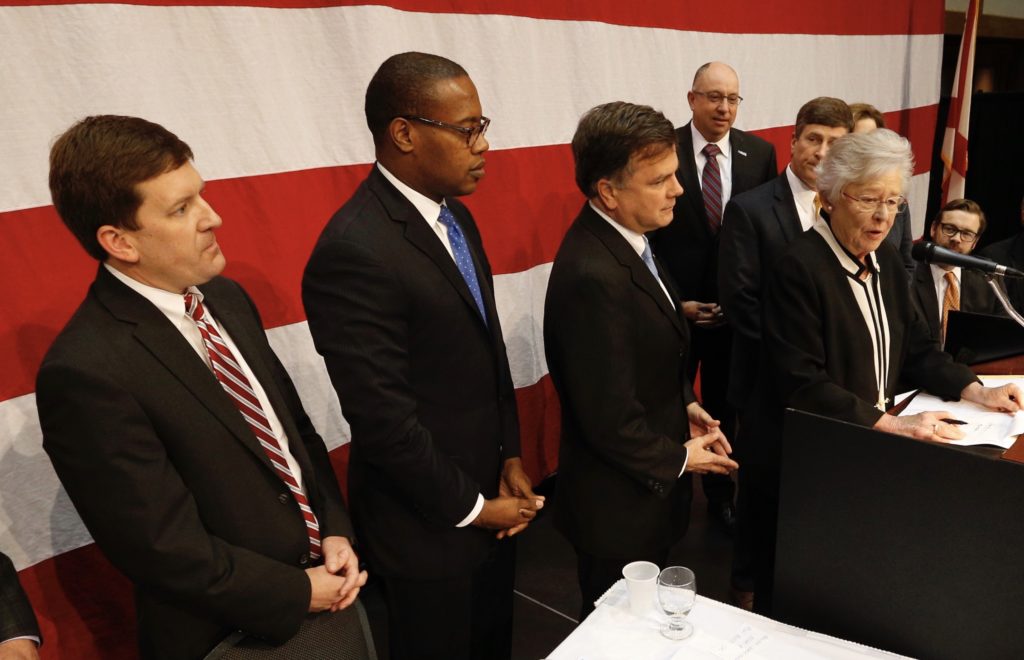
Governor Kay Ivey on Monday signed into law a pair of bills SB212 and SB175, which creates the Alabama School of Cyber Technology and Engineering and funding the 2019 education budget, respectively. SB212: Alabama School of Cyber Technology and Engineering Sponsored by Decatur-Republican State Sen. Arthur Orr and Huntsville-Democrat, House Democratic Leader State Rep. Anthony Daniels, SB212 creates the Alabama School of Cyber Technology and Engineering in Huntsville. The school will be an independent, residential school that is established for academically-motivated and gifted Alabama students with educational opportunities and experiences in the rapidly growing fields of cyber technology and engineering. The school will also assist teachers, administrators, and superintendents across the state in replicating cyber technology and engineering studies in their own schools. “The Alabama School of Cyber Technology and Engineering will prepare some of our state’s highest-achieving students to enter the growing fields of cyber technology and engineering,”Ivey said. “Just as Huntsville has always been on the leading edge of the rocket and aerospace industries, the Alabama School of Cyber Technology and Engineering will ensure that Alabama students are at the forefront of today’s emerging technologies.” Orr said he envisions students from across the country wanting to relocate and attend the school. “I see the school as a real magnet for gifted students not only from all over the state, but also from across the country who may want to relocate here to be able to access such a world class, cutting-edge education in the fields of cyber and engineering. The graduates of the school will be long term contributors to this state’s growth in these emerging areas,” explained Orr. “Today is an important day for Huntsville, our state and, most importantly, our young people. In addition to continuing to grow our reputation as an emerging hub in the tech and cybersecurity industry, this school will provide our students the opportunity to become the next generation of innovators by giving them a jump-start on careers in technology, engineering, and protecting our nation’s cyberinfrastructure,” added Daniels. The Huntsville/Madison County Chamber of Commerce was instrumental in coordinating efforts between the Chamber, Cyber Huntsville and the Alabama School of Cyber and Engineering Foundation. “We are pleased that the vision for an Alabama cyber technology and engineering magnet school has been acted upon by our state leaders,” said Alicia Ryan, Vice President of the Cyber Huntsville Board and President of the Alabama School of Cyber and Engineering Foundation. “This school will provide a wonderful opportunity for students from across Alabama to get early exposure to new STEM-based curriculum that will prepare them for exciting cyber and engineering career paths. By enabling unique educational opportunities today, we are building our workforce for the future.” A location for the school has yet to be selected. The legislation allows for the school to open and formally begin operation during the fall semester of 2020. SB175: Education Budget Ivey also signed the Education Budget on Monday, which was also sponsored by Decatur-Republican State Sen. Arthur Orr along with Tuscaloosa-Republican and Committee chair state Rep. Bill Poole. The 2019 budget provides a historic level of funding for all aspects of the state’s education system. It also includes a 2.5 percent raise for all education employees. “I am proud to have worked closely with the Legislature to pass a historic Education Budget which gives a raise to our teachers and school employees, increases funding for our voluntary Frist-Class Pre-K Program and provides more opportunities for higher-education students across Alabama,” Ivey commented. “I am committed to improving education in Alabama for everyone, regardless of where they live or the economic resources available to them.” The Education Trust Fund Budget is the largest investment in education in a decade, and was passed with overwhelming bipartisan support. “Alabama’s teachers and education support staff have an important task – educating our children – our children who are the key to our state’s success,” Ivey added. “It is important that we attract the best people possible to work in our education system and this pay raise will help us do that.” The budget covers the fiscal year 2019 which begins in October.
Donald Trump to discuss tax cuts at West Virginia round-table

President Donald Trump will promote recent tax cuts during a round-table discussion in West Virginia this week. The White House says Trump is hosting Thursday’s discussion at the Sulphur Springs Civic Center in White Sulphur Springs. Trump signed legislation late last year that cut taxes significantly for corporations and the wealthy and provided more modest tax breaks for middle-income earners. A March survey by The Associated Press-NORC Center for Public Affairs Research found that an improving economy and the tax cuts passed by Republicans appear to have helped lift Trump’s approval ratings to 42 percent — up seven points from February. No Democrats voted to cut taxes. Trump tells audiences that Democrats will raise their taxes if Republicans lose control of both houses of Congress in the November elections. Republished with the permission of the Associated Press.
DC officials cite gun control hypocrisy in condemning Marco Rubio

It was one week after the fatal shootings at a Parkland, Florida, high school, and Republican Sen. Marco Rubio was looking to show solidarity with an angry crowd of parents and students in his home state. He told them — and a national television audience — that 18-year-olds should not be able to buy a rifle and said, “I will support a law that takes that right away.” About 1,000 miles (1,600 kilometers) north, District of Columbia officials could only shake their heads in disbelief. The city already had a law barring 18-year-olds from buying rifles, yet Rubio was the main senator pushing legislation to end that ban, as well as D.C.’s prohibition of assault weapons. “Rubio’s gun bill should be a public embarrassment as well as a personal embarrassment to him,” said Eleanor Holmes Norton, Washington’s nonvoting delegate in Congress. Gun control has long been a sore point in relations between officials in this heavily Democratic city, home to some of the nation’s toughest gun control laws, and Republicans, who as the congressional majority have power over D.C.’s laws. The strong feelings have intensified with the nation at a crossroads moment in the gun control debate after the Feb. 14 shootings at Marjory Stoneman Douglas High School and a subsequent “March for Our Lives” gun-control rally in Washington. Rubio, in particular, is seen as the villain. City officials accuse him of playing cynical political games with the lives of Washington residents to curry favor with the National Rifle Association. Following the town hall, Washington Mayor Muriel Bowser challenged Rubio to withdraw his bill. Rubio sent her a letter saying that he and Bowser “share a common goal” and that his bill seeks only to bring Washington “in line with federal law.” If federal law changes —which Rubio said is his goal — then Washington’s laws would change as well. Bowser, a Democrat, posted the letter on Twitter with her handwritten notes and objections written in the margins. Those notes include Bowser calling Rubio’s stance “the epitome of hypocrisy.” “He’s just using it to boost his NRA score,” Bowser said in an interview with The Associated Press. “What we think Marco Rubio should be focused on is his job.” Asked for comment by The Associated Press, Rubio staffers responded by providing the Rubio letter that Bowser had posted. Rubio introduced the bill, known as the Second Amendment Enforcement Act, in 2015 and again in 2017. According to the NRA website, Rubio has an A-plus rating. Among its list of Rubio accomplishments is that he “sponsored legislation that would repeal Washington, D.C.’s draconian gun control laws and restore the right of self-defense to law-abiding individuals in our nation’s capital.” Norton said she’s been fighting off similar bills in Congress for years. Another one, sponsored by Virginia Republican Tom Garrett, exists in the House. Neither of them has much chance of passing because the Republican majorities in Congress wouldn’t hold together on such a divisive issue, she said. “The worst part is why he did it. Why would a senator from Florida take on this issue?” Norton asked. “He’s coming back every year for his NRA payoff.” According to public records, Rubio received just under $10,000 directly from the NRA during the 2016 election. However the nonpartisan Center for Responsive Politics, which combines direct contributions from the NRA with contributions from like-minded affiliates, super PACs and money spent on campaign ads on behalf of the candidate, estimates that Rubio has received more than $3.3 million over the course of his career, making him the 6th-highest recipient in Congress. The Washington government has bristled for years under what officials call the heavy-handed and arrogant oversight of Congress, which has the right to alter or spike all Washington laws. Washington has long fought to defend its strict gun control. A 2008 Supreme Court ruling declared Washington’s blanket ban on handgun ownership unconstitutional. Washington restrictions such as preventing gun owners from registering more than one gun per month and requiring re-registration every three years also have been struck down by the courts. The issues of Washington’s autonomy and its gun control laws are deeply intertwined. The closest Washington has come in recent years to having a vote in Congress unraveled over gun control. Republicans have opposed statehood for the District of Columbia, which would boost Democratic power in Congress. Despite the Republican Party’s general opposition to federal interference in state issues, the official GOP platform stance on D.C. statehood is that it can only be achieved via constitutional amendment. The platform states that “the nation’s capital city is a special responsibility of the federal government because it belongs both to its residents and to all Americans.” A 2009 compromise proposed creating a new congressional district in heavily Republican Utah. In exchange, Washington’s House delegate seat would be upgraded to full voting status. However, as the D.C. Voting Rights Act worked its way through Congress, Republican Nevada Sen. John Ensign attached a rider that would have required Washington to abolish most of its gun-ownership restrictions. The city government concluded it was too high a price to pay and the bill was shelved. Republished with the permission of the Associated Press.


